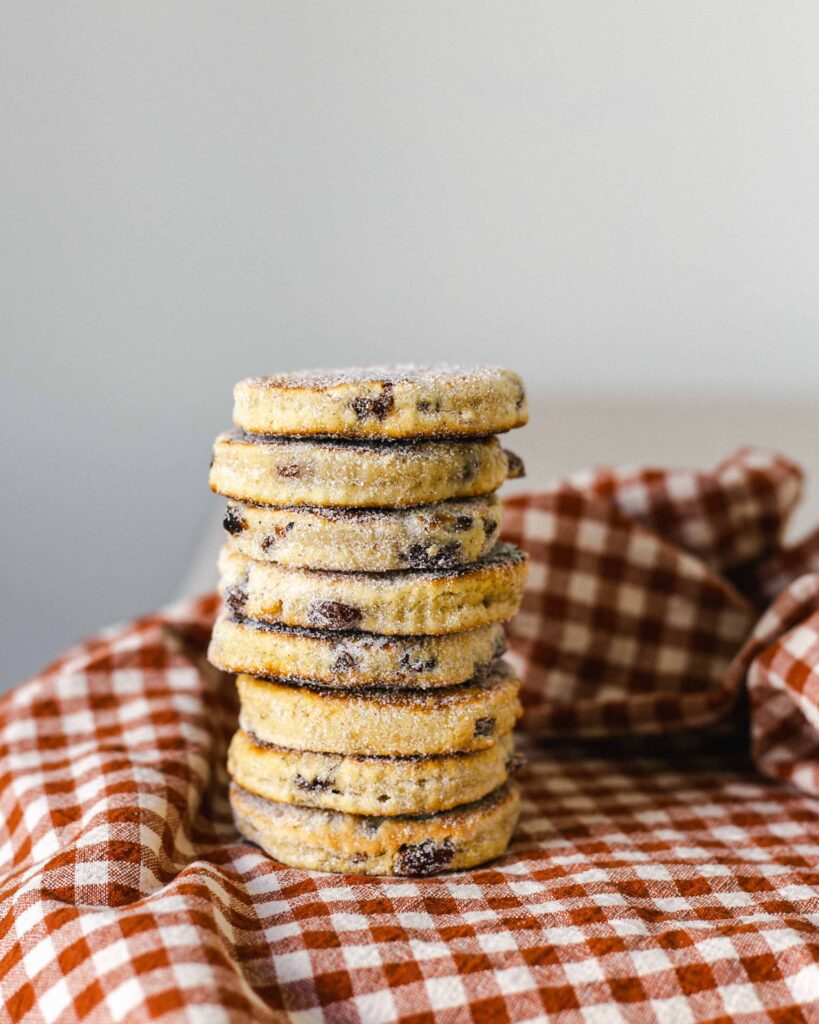
(cut your tart slowly and not in a rush for a crack-free option!)
This is my recipe for gluten free baked lemon tart. A recipe I demo’d at the Allergy & Free From Show in London with FREEE earlier this year, that I’ve been promising to share ever since. It’s got a sweet shortcrust pastry base that finds the perfect balance between delicate and sturdy (rather than puff pastry or pie dough where we’re trying to create big flaky layers, we’re aiming for more of a cookie dough; tender, buttery and all the satisfying). And then a sharp, zingy, lemon custard filling, that’s not-too-sweet, silky smooth and crucially, only just-set. Baked lemon tart is one of my absolute favourite desserts and if it’s not one of yours too, I hope this might sway you.
My gluten-free baking tips
When it comes to gluten-free baking, I tend to lower oven temperatures by 10-20c, which means fan 170c or 180c for pastry, depending on the recipe. This is because gluten-free flours tend to need and to absorb more liquid, which means baking can take a little longer. By lowering the oven temp the middle of your bake has a chance to cook through before the outside is overcooked.
When cooking the filling here, I turn the temp right down to 120c fan – you could go higher, for a more soufflé effect, where the filling puffs up and then sinks a little, but I prefer a gently cooked, soft and silky smooth just-set. So 120c fan for me it is.
As always, you can find my gluten-free and FODMAP friendly recipe notes below and don’t hesitate to get in touch with any baking questions.

I demo’d mini versions at the Allergy & Free From Show – you could make 6-8 with the recipe, depending on the sizes of your tins. Bake both the pastry and filling for less time
A few delicious variations:
- Higher FODMAP = sprinkle over finely chopped pistachios
- Nut free variation = swap out the ground almonds for more flour
- Dairy free variation = use dairy free butter and cream
- Add jam! Add a few big dollops of jam to the bottom of the tart case, spread into a thin layer and place into the oven for a few minutes to set up before continuing with the lemon filling
Ingredients
For the sweet shortcrust pastry:
180g gluten free plain flour
30g ground almonds
1 teaspoon xanthan gum
1/2 teaspoon fine sea salt
100g unsalted butter, cold and cut into cubes
3 tablespoons icing sugar
1 medium egg, whisked
For the filling:
Zest and juice of 4 lemons (roughly 140ml lemon juice)
150g double cream, can be lactose free
140g caster sugar
4 medium free-range eggs
1 medium egg, whisked, for egg wash
To serve
Crème fraîche or lactose free yogurt
Icing sugar
Lemon or lime zest
Method
Ideally start the pastry the day before, or at least a few hours. Add the gluten free flour, ground almonds, xanthan gum and salt into a bowl and stir with a fork to combine. Add the butter to the flour mixture and rub in with your fingertips until the mixture resembles fine breadcrumbs. Alternatively, use a food processor and pulse the ingredients to combine (I find this much easier as I have hot hands!) Sift over the sugar and stir it in.
Add the egg and work it into the mix with a cutlery knife, or by pulsing in your food processor. You shouldn’t need to, but add a teaspoon of cold water if the mix looks dry at all. It should almost resemble cookie dough.
Tip the pastry out onto cling film and shape into a disc, touching the dough as little as possible, but making sure the dough is smooth and there are no cracks. Wrap tightly and chill in the fridge overnight or for a minimum of 2 hours.
When you’re ready to bake the pastry, preheat your oven to 190c/170c fan and have ready a 9inch loose-bottomed fluted tart tin. Roll out your chilled pastry onto a clean, floured surface, to the thickness of a pound coin. Cut out a circle a little bigger than your tin and using your rolling pin, lift up the pastry and place it over the tart tin, pushing the pastry into the edges. Cut off any excess, leaving a small overhang. Place the pastry in the fridge for 30 minutes to firm up.
When chilled, prick the base of the pastry all over with a fork, then line with scrunched and un-scrunched greaseproof paper and fill with baking beans. Place the tart case on a baking tray and blind bake for 15-20 minutes, then remove the paper and baking beans and bake the tart case for another 5-10 minutes, or until the pastry is golden, sandy to the touch and has no grey patches. Remove the tart case from the oven, brush with egg wash and place back in the oven for 5 minutes until golden. Remove the tart case from the oven and turn the oven down to 120c fan. When cool, use a sharp knife (I like a small serrated one) to trim the edges of your pastry case, for a level, even finish.
To make the filling, whisk together the zest and juice of 4 lemons, the double cream, caster sugar and eggs into a medium saucepan. Over a very low heat, gently warm the filling, continually stirring, until it reaches 55-60c (another great reminder from Nicola Lamb – see notes below!) Doing this helps stabilise the custard, starts the cooking process and basically prevents you from ending up with two separate layers of the filling when baked (a question and frustration from somebody at the AFFS about a previous lemon tart attempt, that I was happy to answer!). You shouldn’t need to warm the filling first if you’re making smaller tarts.
Pass the warmed mixture through a sieve into a jug and remove any larger bubbles on the surface. Place the tart case back into the oven for a few to warm up and then pour in the filling.
Bake for 20-25 minutes, or until just set with a lovely wobble in the middle. Timings can really vary so just keep an eye. Let cool to room temp and then chill in the fridge for a couple of hours before serving with an extra sprinkle of icing sugar, lemon or lime zest, crème fraîche or lactose free yogurt.
Gluten free baked lemon tart recipe notes:
- A shout out to Nicola Lamb’s Lemon tart newsletter for a deep-dive into the delicious dessert and a reminder to egg wash and seal the tart case properly when blind baking as it’s such a runny filling. Bonus also being that it gives the tart case a lovely golden colour which gluten-free tarts and flours can often lack
- I watched Claire Saffitz make a thick paste out of flour and water to plug small holes in a tart case instead of pastry and now I make a thick paste out of flour and water to plug small holes in a tart case instead of pastry. Just don’t go too heavy as patched areas can be a bit crunchy when baked!
- This recipe uses FODMAP friendly ingredients and should fit in with FODMAP limits. I follow the Monash University app data to create FODMAP friendly recipes – if unsure, as always, please ask your dietician or GP
Final note – I tried increasing the amount filling – more is more, right? But actually I preferred a thinner filling as the larger volume of filling resulted in a bit more of a ‘crust’ on top. I preferred the pastry to filling ratio too.






